The U.S. election cycle is in full swing a full nine months before voters actually go to the polls on November 4th. On "Super Tuesday" registered voters in 24 states came out to vote in caucuses and primary elections as part of the process to determine the major parties' presidential candidates at their respective national conventions in late August / early September. In most Republican contests, delegates are awarded on a "winner takes all" basis, whereas most delegates to the Democratic convention are awarded on a proportional basis, based on the number of congressional districts won within each state.
Early caucuses, primaries and conventions in Iowa, New Hampshire, Wyoming, Michigan, Nevada, South Carolina, Hawaii, Florida, and Maine had already provided some indication as to who the most likely nominees would be. Once considered a potential front-runner, Republican Rudy Giuliani of New York dropped out after poor showings in Iowa, New Hampshire, and then Florida. Republican Fred Thompson, a Hollywood actor and conservative icon was also forced out of the race early on. Democrat John Edwards of South Carolina, whose populist speeches made him an early favorite among many union voters, failed to build on the "son-of-a-mill-worker" image he cultivated and was also forced to retire from contention.
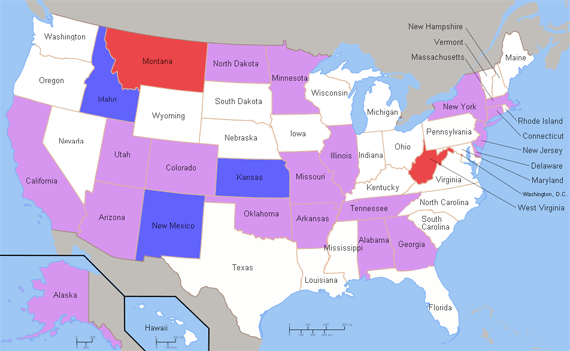 |
| Twenty-four states held caucuses or primary elections on Super Tuesday, 2008. Blue denotes Democratic-only caucuses (3), Red denotes Republican-only contests (2), and Purple represents states holding elections for both parties (19). Note: American Samoa (not shown) is Democratic only. |
Heading into Tuesday's contest, in which delegate-rich states such as California and New York were at stake, Republican Senator John McCain of Arizona had been surging in the polls against rivals former Massachusetts Governor Mitt Romney and former Arkansas Governor Mike Huckabee. On the Democratic side, Senator Barack Obama of Illinois had dramatically closed the gap with long-time front-runner and presumptive nominee Senator Hillary Clinton of New York and had even overtaken her in several opinion polls. With so many delegates at stake, candidates from both parties hoped establish their dominance.
Both Huckabee and Romney won a handful of states, but John McCain was the clear winner for the "Grand Old Party" (GOP), edging out both his rivals to establish a comfortable lead headed into the remaining primaries and caucuses. In addition to California's 170 and New York's 101 delegates, McCain also won Connecticut, Illinois, Missouri, New Jersey, Oklahoma, Delaware and his home state of Arizona. 1,191 delegates are needed for the Republican nomination. So far, McCain has 514 delegates as compared to Romney's 177 and Huckabee's 122.
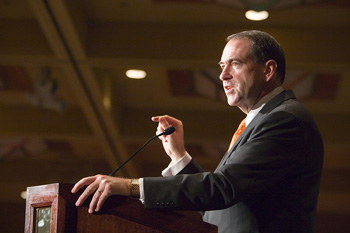 |
| Mike Huckabee (by David Ball) |
On the Democratic side, the statistical tie between Clinton and Obama continued, with Obama winning more states, but Clinton winning states with larger numbers of delegates. Neither candidate has more than half the 2,025 delegates needed to secure the Democratic nomination. Heading into primaries and caucuses in Kansas, Nebraska, Louisiana, Washington State, Maine, Virginia, Maryland, the District of Columbia, Hawaii, and Wisconsin, Obama now has more delegates pledged to vote for him and is expected to do well. Then on March 4th, Texas and Ohio will hold their primaries, where Clinton is expected to have an advantage. But Obama is now also raising more money than Clinton, who had long been the "darling of Wall Street." He raised $32 million in January. In response, Clinton loaned her campaign $5 million from her personal fortune to keep up the pace.
After seven years of Bush and his policies, there is widespread discontent with the status quo, with the state of the economy and the Iraq War at the top of most voters' lists of concerns. But with Bush unable to run for re-election and no one from his immediate circle of cronies in the race, the 2008 elections are more or less wide open, at least on paper. So what chances do the remaining candidates have of winning the presidency in November?
"Anyone but Bush"
For the Republicans, it seems most likely at this stage that McCain will be the nominee, although there could still be some surprises in store. As compared to the neo-cons of the Bush White House, he is a more calculating Republican of the "old school" type, a military veteran and ex-prisoner of war, seen as too "liberal" by some in his party. But above all, he is a staunch defender of U.S. capitalism and imperialism. He therefore appeals both to the capitalist class as it enters a period of increased domestic and international instability, and also to those conservative voters who have had enough of the likes of Bush and Cheney.
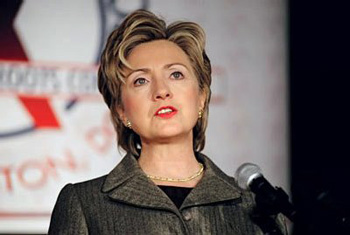 |
| Hillary Clinton |
Nonetheless, Republicans are far from united around McCain. His biggest base of support is among so-called "moderate" or "liberal" Republicans. But conservative radio icon Rush Limbaugh recently proclaimed that "McCain will kill conservatism as a dominant force in the Republican Party." And conservative commentator Ann Coulter, in a frank admission that there is little difference between the major party candidates, had this to say: "If he's our candidate, then Hillary is going to be our girl, because she's more conservative than he is. I think she would be stronger on the war on terrorism." Coulter then said she is even prepared to campaign for Clinton should McCain win the Republican nomination. Mitt Romney is considered "the last true conservative" in the race, while Evangelical Christians have so far been looking to Mike Huckabee.
But despite alienating some layers of the socially conservative / religious base of his party for his allegedly "liberal" views on torture and immigration, his "maverick" persona appeals to conservative independents. And in the aftermath of his broad "Super Tuesday" support, it is likely many Republicans will settle on McCain as the best possibility in what will likely be a difficult election for the incumbent party. In a hypothetical contest between McCain and either Clinton or Obama, McCain is polling favorably.
As for the Democrats, both Clinton and Obama poll well against any of the remaining Republican contenders. Clinton is seen as the experienced "insider," a corporate Democrat who knows the ins and outs of domestic and international policy. She has a slight edge with women and white voters, as well as with Latinos. Obama is seen as a relative newcomer; young, fresh, and inspiring, and has won the overwhelming majority of votes cast by Blacks. He has also done particularly well with college students, and has in general done well in the South.
With the nomination still up for grabs, most commentators give Obama a better chance of unseating Clinton for the prize the longer this preliminary stage of the presidential contest continues. It is not ruled out that they could arrive at the Denver, Colorado convention in late August with neither candidate having a majority of delegates. In the final analysis, it is the party tops and their corporate paymasters who will decide.
Change we can believe in?
After nearly 8 years of Republican rule, it is natural that "the other party" stands to benefit, especially given the legacy Bush is leaving behind. There has therefore been a surge of support among Democratic voters for these candidates, especially among young people and minorities, who yearn for a solution to the increasingly difficult situation facing millions of Americans.
Voters in both parties rate the economy as their most important issue. Democrats ranked the war in Iraq second and health care third. Republican voters said immigration was second most important, followed by the war in Iraq. The growing economic crisis is leading to the increased polarization of U.S. society, both to the left and to the right, and without any real alternative, workers are searching for solutions to their problems within the familiar limits of the two party system.
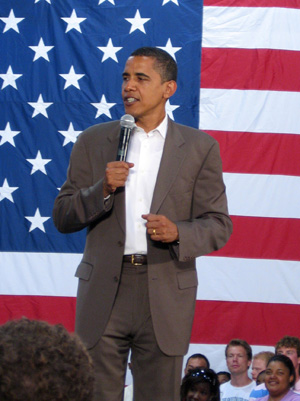 |
| Barack Obama |
Not surprisingly, there is a lot of talk about the need for "change" and "hope," and indeed, the record numbers that turned out for the Super Tuesday primaries and caucuses, and in particular for Democrats, is an indication that voters have had enough of the current administration's policies and are eager for a change, that they want to believe that this really isn't "as good as it gets." McCain the "maverick" promises to change "business as usual" in Washington. And the fact that Clinton, a woman, and Obama, a Black man, are not only the candidates of choice for the Democrats, but also have very good chance of winning in a general election, is another indication of the thirst for change. There has never been a woman or a Black presidential nominee. But what does all of this mean for ordinary working people? What kind of "change" will these candidates actually bring? Do any of these candidates truly represent the interests of the majority?
While all three leading candidates present themselves as representing "change" the big buzz so far has been around Obama. He has carefully and cynically presented himself as being all things to all people, using fiery rhetoric to benefit from American workers' strong desire for change, while presenting a firm, responsible and "moderate" face to corporate America. His campaign slogan is "Change We Can Believe In," and in his Super Tuesday victory speech in Illinois he said: "Our time has come, our movement is real, and change is coming to America." But what kind of change does he propose?
Although these days he emphasizes that he has been against the Iraq War from the very beginning, he told the New York Times in 2004 that there was very little difference between Bush and himself on the Iraq War, and that he didn't know how he would have voted on the resolution that authorized Bush to go to war (he wasn't a member of the Senate when the vote was taken). And despite his efforts to play up alleged differences, his voting record is actually little different from Clinton's. His general views on the capitalist system are quite clear:
"It takes a trip overseas to fully appreciate just how good Americans have it; even our poor take for granted goods and services - electricity, clean water, indoor plumbing, telephones, televisions, and household appliances - that are still unattainable for most of the world. America may have been blessed with some of the planet's best real estate, but clearly it's not just our natural resources that account for our economic success. Our greatest asset has been our system of social organization, a system that for generations has encouraged constant innovation, individual initiative and efficient allocation of resources...our free market system." (Excerpted from his book The Audacity of Hope)
When he speaks about the negative effects of tax cuts for the rich, he does not oppose them, but says only that such cuts should go to corporations that don't export jobs overseas. And although he fires up the worker-friendly rhetoric for live audiences, in The Audacity of Hope he takes the following view:
"There are seeds of anarchy in the idea of individual freedom, an intoxicating danger in the idea of equality. For if everybody is truly free, without the constraints of birth or rank and an inherited social order, how can we ever hope to form a society that coheres?"
And as for U.S. imperialism's adventures abroad, he recently had this to say to Foreign Affairs magazine:
"The American moment is not over, but it must be seized anew... A strong military is, more than anything, necessary to sustain peace...we must become better prepared to put boots on the ground in order to take on foes on a global scale...I will not hesitate to use force unilaterally, if necessary, to protect the American people or our vital interests...We must also consider using military force in circumstances beyond self-defense, in order to provide for the common security that underpins global stability - to support friends, participate in stability and reconstruction operations, or confront mass atrocities."
While McCain has staked his reputation on the full-on continuation of the wars in Iraq and Afghanistan, Clinton and Obama have played on voters' overwhelming opposition to the Iraq War. But neither of them are for stopping all funding for these wars and for immediately withdrawing all of the troops. Most importantly from the perspective of working Americans, none of the candidates have any concrete proposals to provide genuine universal health care and education, to create jobs and rebuild the country's infrastructure, to truly address the housing crisis and provide safe and affordable housing for all, to grant immediate and unconditional legalization for undocumented immigrants and their families, to end tax cuts for the rich and instead tax them heavily to pay for social needs, etc.
In other words, there are no fundamental differences between Clinton, Obama, or McCain. All of them have bent over backwards to prove to the ruling class that they are best suited to guide the system through the rocky times ahead, that they can be trusted with this responsibility, that they can contain the simmering discontent within limits that do not threaten the system.
Follow the Money
According to OpenSecrets.org, the web site of the Center for Responsive Politics (CRP), the 2008 election cycle is on track to be the most expensive ever. In 2004, during the last presidential election, a record $880.5 million was raised. The CRP estimates that over a $1 billion will be raised this time around. What ordinary worker could ever come close to having that kind of money? Even with millions in personal money invested in their campaigns, the only way to raise the money needed to run a modern-day presidential campaign is to turn to the big boys on Wall Street. It is no accident that investment banks Lehman Brothers and Merrill Lynch, and technology giants Microsoft and Google are among the largest contributors to the leading candidates of both parties. Lehman Brothers and Microsoft were the biggest overall donors in the fourth quarter of 2007, while Goldman Sachs and Citigroup were the biggest corporate donors for the year. According to the CRP, lawyers and law firms contributed more than any other industry in the fourth quarter of 2007.
Here are the figures compiled by the CRP on where the big money is going:
- Hillary Clinton
Top contributors so far: DLA Piper ($470,150); Goldman Sachs ($407,561); Morgan Stanley ($362,700); Citigroup ($350,895); and Lehman Brothers ($237,270). - Barack Obama
Top contributors so far: Goldman Sachs ($421,763); UBS ($296,670); Lehman Brothers ($250,630); National Amusements ($245,843); and JP Morgan Chase ($240,788). - Mitt Romney
Top contributors so far: Goldman Sachs ($223,925); Merrill Lynch ($163,020); Citigroup ($162,950); Morgan Stanley ($152,050); and Lehman Brothers ($137,450). - John McCain
Top contributors so far: Merrill Lynch ($155,950); Citigroup ($153,362); Blank Rome ($143,501); Greenberg Traurig ($130,587); and Goldman Sachs ($85,252).
Notice a pattern? Like all good investors, the big boys hedge their bets and cover all their bases. But as every American knows, there's no such thing as a free lunch: none of this money comes without strings attached. The primaries and caucuses are intended to make ordinary Americans feel as though their votes and opinions actually count. But ultimately, the party tops choose the candidates, and the party tops are ultimately in the pockets of those who write their paychecks.
Economic, social and geopolitical instability
The next President of the United States of America will not get to pick and choose his or her agenda. The agenda will be set by the crisis facing the capitalist system both at home and abroad. Remember, Bush ran on an "America First" domestic agenda, but was forced by events to become most aggressive imperialist in U.S. history. The next occupant of the White House will inherit an increasingly unstable world and an economic downturn of unknown depth or duration.
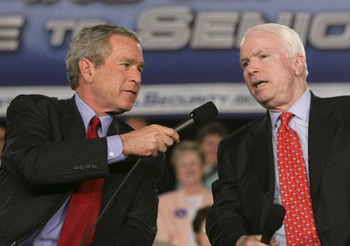 |
| President Bush and Senator McCain |
The U.S. economy slowed down dramatically in the fourth quarter of 2007, growing by just 0.6 percent, with total growth for the year at just 2.2 percent, the worst figure since 2002. Spending on new housing projects fell in 2007 by 16.9 percent, the worst fall in 25 years. As reported by Reuters, the services sector, which accounts for the majority of U.S. economic activity, fell sharply in January, to levels not seen since the 2001 recession. The Institute for Supply Management's index for the non-manufacturing sector plummeted to 41.9 from 54.4 in December. A reading below 50 indicates contraction, reinforcing investors' concern that the U.S. economy is already in recession. The employment index fell to 43.9 from 51.8, corroborating last week's grim U.S. payrolls report, which showed the first net monthly contraction in the labor market in more than four years.
This has already led to decreasing government revenues, and yet Bush has proposed a budget which tops $3 trillion for the first time in U.S. history. By Bush's own estimates, it will lead to deficits of $410 billion in 2008 and $407 billion in 2009, bringing the overall Federal deficit to $5.9 trillion, up from $3.3 trillion when he took office. $2.3 trillion of this debt is held by foreign banks and investors.
The budget dramatically increases spending on the military and military aid to key allies around the world, while further cutting already depleted domestic programs such as Medicare and abolishing dozens of other social services programs. Some $515 billion to be allocated to the Defense Department, not including a separate request for billions more for the wars in Iraq and Afghanistan. Adjusted for inflation, this will be the largest military budget since World War II. According to a recent Congressional Research Service (CRS) report, the average monthly cost reached $10.3 billion in the fiscal year ending Sept. 30, 2007, up from $4.4 billion in fiscal year 2004. By the end of 2009, the cost of the Iraq and Afghanistan wars could reach $1 trillion. This is a true "guns before butter" budget, an open declaration of increased militarism abroad and a further relentless attack on workers here at home. The ruling class will expect more of the same ruthless cuts from the next Republican or Democrat to sit in the Oval Office.
During the economic expansion of the last few years, a smaller share than ever went to workers' wages, as compared to corporate profits. Long-term unemployment is at record levels and millions are no longer even considered part of the workforce. Already, over one million families have lost or will lose their homes, and it is estimated that millions will lose their jobs in the recession that in many analysts' view is already upon us. If during the economic expansion workers were left out in the cold, it will be even worse during a recession. This will have a profound effect on the consciousness of American workers, which has already been shaken by the events and experience of the last few years. As the "American Dream" is rapidly transformed into an "American Nightmare," millions will begin to question the very system that leads to such instability. The next president will inevitably appeal for national and bi-partisan "unity" in an epoch of growing polarization and inequality. In other words, he or she will call on American workers subordinate their interests to the interests of the rich, to tighten their belts further in the interest of preserving the system that profits off of their labor.
For a mass party of labor!
The main candidates have not yet been definitively decided by "Super Tuesday." At this stage, McCain appears to be a near shoe-in for the Republicans. But whether it's Clinton or Obama in the end, the Democrats have reason to be confident, especially given the widespread discontent with the party currently in power (and because most people see no other alternative). But the Democrats' track record in recent presidential elections and while in control of Congress has left many people disillusioned, and their victory is by no means assured. A lot can and will happen in next few months. The economy will be a major factor, as will the international situation. The choice of vice-presidential running mate will also play a certain role. There is also plenty of time for Clinton and Obama to beat each other up before the nomination and to sour the electorate on them both. Nonetheless, it is likely that the Democrats will inherit the mess left behind by Bush.
 |
| Mitt Romney |
The large "Super Tuesday" turnout for the Democrats in particular reflects a shift to the left within the narrow limits of the current U.S. electoral setup, a healthy rejection of status quo. But we must be clear: there is simply no solution to the problems faced by the working class majority within those limits. And while there are a handful of candidates exploring third party bids, there are none that have any real chance at making serious inroads into the two party duopoly. But as we have explained many times in the past, the power and money of big business and their politicians can be combated and defeated. A mass party of labor based on the unions, with all the organizing and financial power the unions have at their disposal, fighting for a program that truly represents workers' interests, could rapidly break the stranglehold of the Democrats and Republicans.
There are many sincere illusions in the Democrats, and in the idea that a woman or a Black man will somehow be better able to reflect the interests of working people. But what matters most is the class interests these politicians represent, and it is clear that they are both firmly on the side of big business and the system of capitalist exploitation. The vast majority of Americans will have to learn this the hard way, through their own bitter experience. If the Democrats succeed in gaining control of both houses of Congress and the White House, there will be no more excuses for not ending the war in Iraq, providing health care, education and housing for all, repealing anti-labor legislation and rebuilding the country's infrastructure. After a few years in the "school" of the Democratic party, the real questioning and search for alternatives that truly represent working people will begin.
We are still far from knowing who the next President of the United States will be, but we can make one firm prediction in advance: the winner will not represent a fundamental break with Bush's pro-capitalist policies, and will not represent the interests of the working class. For that, U.S. workers need a party of their own: a mass party of labor.
- USA: Why Workers Need a Labor Party by Ed Riley in the U.S. (February 7, 2008)
- Election 2008 & the U.S. Working Class by the Editorial Board US Socialist Appeal (January 14, 2008)
